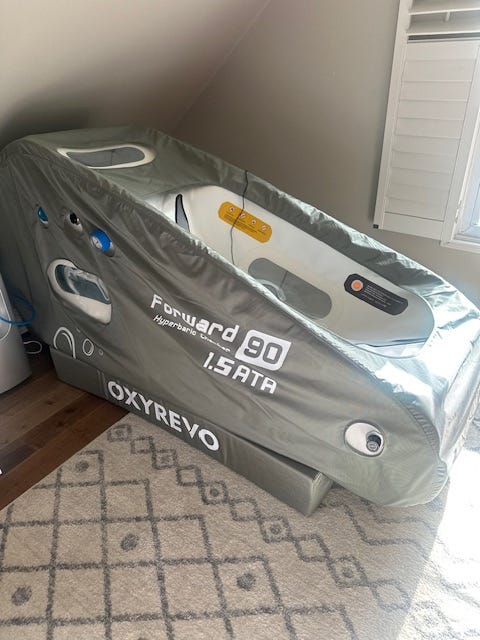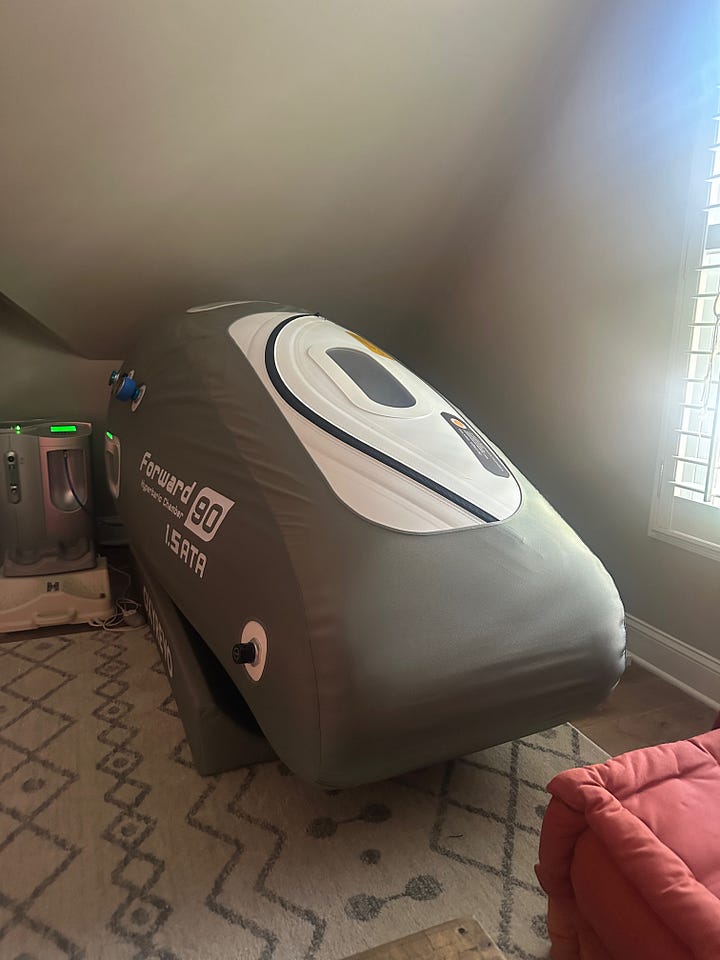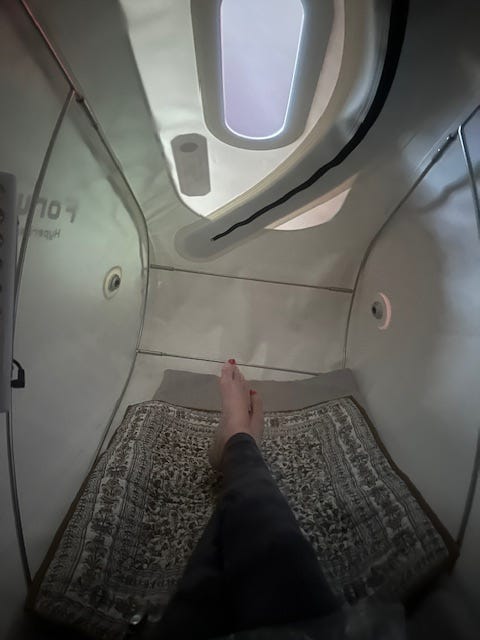The Power of Hyperbaric Oxygen: A Groundbreaking Approach to Protecting Brain Health
Exploring the Emerging Benefits of Hyperbaric Oxygen Therapy for Brain Health and Neuroprotection
Introduction
In the realm of alternative therapies, Hyperbaric Oxygen Therapy (HBOT) has gained significant attention for its remarkable ability to promote healing and improve overall health. While it’s often used for wound healing, recovery from injuries, and treatment of open wounds from conditions like diabetes, one of its most exciting applications is in the protection and enhancement of brain health. Emerging research suggests that Hyperbaric Oxygen can play a key role in reducing brain damage, promoting neuroplasticity, and protecting against neurodegenerative conditions.
In this article, I’ll dive deep into the science behind HBOT, its potential benefits for brain health, and review studies supporting these assertions.
What is Hyperbaric Oxygen Therapy (HBOT)?
HBOT involves breathing 100% oxygen in a pressurized chamber, which allows the lungs to absorb more oxygen than would be possible at normal atmospheric pressure. The oxygen is then delivered to tissues throughout the body, including the brain.
HBOT’s impact on the brain—particularly in protecting it from injury and supporting cognitive function—has garnered increasing attention in recent years.
The Brain and Hyperbaric Oxygen Therapy: How It Works
The brain is an oxygen-hungry organ. Even slight dips in oxygen levels can result in serious consequences, including neuroinflammation, cell death, and impaired cognitive function. Hyperbaric oxygen works by increasing the amount of oxygen available to brain cells, potentially reversing some of the damage caused by oxygen deprivation (hypoxia) and supporting neurogenesis (the creation of new neurons).
Key Mechanisms:
Neuroprotection: Oxygen enhances the production of growth factors, such as brain-derived neurotrophic factor (BDNF), which supports the survival and growth of neurons. This can help protect against neurodegeneration and brain injury.
Reduced Inflammation: Inflammation in the brain is linked to many neurological disorders, including Alzheimer's, Parkinson’s, and traumatic brain injury (TBI). Hyperbaric oxygen has been shown to reduce inflammation, potentially mitigating the long-term effects of these conditions.
Enhanced Neuroplasticity: Oxygen promotes neuroplasticity, the brain's ability to reorganize itself by forming new neural connections. This is especially important after brain injuries or strokes, where HBOT may aid in the recovery of lost brain function.
The Benefits of HBOT on Brain Health
1. Traumatic Brain Injury (TBI) and Concussions
Research has shown that HBOT can be an effective treatment for brain injuries, including concussions and more severe TBIs. By increasing oxygen availability to brain tissue, HBOT may reduce the extent of cell death, minimize inflammation, and speed up recovery.
Key Study: A 2013 study published in Neuropsychology found that HBOT significantly improved cognitive function in patients who had sustained mild traumatic brain injuries (concussions). The patients showed improvements in memory, attention, and executive function after undergoing a series of HBOT sessions.
2. Neurodegenerative Diseases
Conditions like Alzheimer’s disease, Parkinson’s disease, and multiple sclerosis often involve damage to neurons and impaired brain function. Some studies suggest that HBOT may slow the progression of these diseases, reduce brain inflammation, and promote neurogenesis, potentially improving cognitive function in patients.
Key Study: A 2015 study in Frontiers in Aging Neuroscience revealed that HBOT improved cognitive performance in patients with Alzheimer's disease, suggesting that oxygen therapy could offer a neuroprotective effect for the aging brain.
3. Stroke Recovery
Stroke survivors often face long-term challenges with cognitive and physical function. HBOT has been studied as a post-stroke treatment, with promising results showing it may improve neuroplasticity, aid in recovery of motor functions, and promote better outcomes for patients.
Key Study: A 2019 randomized controlled trial published in Stroke found that patients who received HBOT after a stroke showed significant improvements in motor function and cognitive abilities compared to those who received conventional treatment.
4. Brain Fog and Cognitive Decline
For individuals experiencing brain fog, cognitive decline, or other age-related cognitive challenges, HBOT offers a non-invasive method to improve brain function. The increased oxygen levels may help rejuvenate brain cells, improving focus, memory, and mental clarity.
Key Study: A study published in The Journal of Alzheimer's Disease in 2020 showed that HBOT improved cognitive function and quality of life in older adults, particularly those with early signs of cognitive decline or mild cognitive impairment (MCI).




Is Hyperbaric Oxygen Therapy Right for You?
While the potential benefits of HBOT for brain health are promising, it is important to understand that it’s not a one-size-fits-all solution. The best candidates for HBOT are those with specific neurological conditions, including brain injury, stroke, neurodegenerative diseases, cognitive decline or at risk. There are soft shell and hard shell HBOT chambers. The soft shell usually has up to 1.5 ATA (atmospheric pressure) and oxygen concentration 92-95% achieved with an oxygen concentrator. HBOT sessions can cost between $75 and $150+ for one session (1 - 1.1/2 hours). Standard recommendations are to do 60 consecutive sessions over 4-6 weeks, then taper off to 2 or 3x a week with occasional breaks. Considering the time commitment required to drive to, and attend sessions, along with the cost of the initial 60 sessions and any additional visits, it was a no-brainer to purchase one for indefinite use by both my husband and me.
If you’re considering investing in a chamber, you can use code APOE4 for 15% off through Morelli Medical - the company I purchased mine from last year. That works out to roughly $1,500 in savings on a unit like mine. Since my husband uses it as well, it’s been a very worthwhile investment in our long-term health and longevity.
Conclusion
Hyperbaric Oxygen Therapy offers a fascinating approach to brain health and neuroprotection, with a growing body of research supporting its potential benefits.
I experienced a pronounced improvement in motivation and energy after about 12 sessions.
As with any medical intervention, it’s crucial to do your research and consult with professionals to make an informed decision. But for those facing risk of cognitive decline or neurodegeneration, HBOT could provide a valuable tool in the fight for better brain health. It’s an investment, but if it helps keep my mind sharp until my last breath, it’s worth every penny.
I also want to share a remarkable update: after several months of consistent hyperbaric oxygen therapy (HBOT), my C-reactive protein (CRP) — which has typically hovered around 1.5 — has dropped to an amazing 0.13! I was absolutely thrilled to see this result and feel confident that HBOT has been the key factor. Even more interestingly, my husband, who does not carry an APOE4 allele and isn’t following my broader prevention regimen, has experienced a similar improvement — his CRP fell from an inflammatory level down to 0.17!

Yes i am a 2.0ATA user and while the first two sessions were scary, right now the whole process is a breeze! Do consider, @cathy if you think it may help with any condition.
I am claustrophobic so at least one thing I don’t need to research!